Indiana Firearm Bill of Sale Form
Selling and buying firearms in the USA is regulated depending on the state. You may need to have an Indiana firearm bill of sale in case of transferring ownership. Find out whether a gun must be registered in this state and why you should use a bill of sale template. Read more if you need to refresh your memory on the basics of bills of sale.
Indiana bill of sale forms – click to get more Indiana-specific bill of sale forms that you might require.
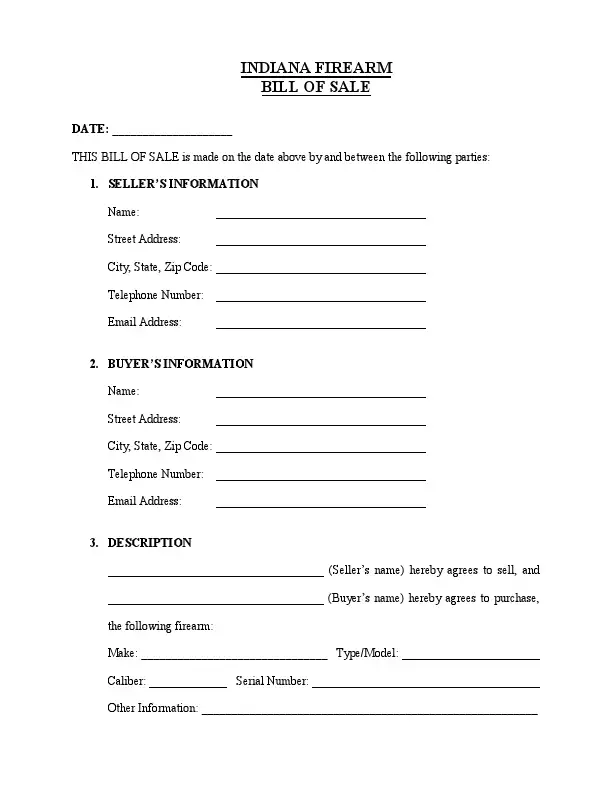
Build Your Document
Answer a few simple questions to make your document in minutes
Save and Print
Save progress and finish on any device, download and print anytime
Sign and Use
Your valid, lawyer-approved document is ready
Can You Carry a Gun in Indiana?
Indiana Code regulates operations with guns, such as purchase, sale, possession, carry, and others. You must have a valid Indiana license to carry a handgun in this state. You can apply for it online. Also, you will need to send your fingerprints electronically. Indiana law does not state anything on open or concealed carry of a gun. However, you should be aware that an exposed firearm in public places may create unnecessary attention to you.
There is a range of places where you are not allowed to carry a handgun even with a valid license.
Such places include:
- School property and school buses
- Aircraft and airports
- State fairgrounds
- Shipping ports
Indiana Firearm Purchase Details
| Subject | Long Guns | Hand Guns |
| Registration of a Firearm | Not required | Not required |
| Permit to Purchase | Not required | Not required |
| Concealed Weapons Permit Fee | $50/$30 local fee + $75 state fee | |
| Background Check for Private Sales | Not required | Not required |
| Persons Prohibited from Carrying Firearms | Indiana Code, Section 35-47-2-3 | |
Do You Need a Bill of Sale to Buy or Sell a Gun in Indiana?
You can purchase a gun from a licensed gun dealer in Indiana if you are a resident of this state. In this case, a background check before transferring a handgun will be conducted by contacting the FBI directly based on Ind. Code Ann. § 35-47-2.5-4(a). In this case, an Indiana firearm bill of sale is not required. The owner of a firearm is not required to register it. However, one can do it voluntarily with local law enforcement.
It is allowed to purchase a gun from a private person or sell it to an individual. Both the buyer and the seller must be residents of the state. No background check is run in this case. However, certain requirements must be fulfilled. For example, you are not allowed to sell a gun to a person older than 18 years old or someone whom you suspect in the intention to commit a crime.
It is recommended to have a bill of sale for the transaction. This form will prove the current ownership of a firearm. You can find a firearm bill of sale form for free on our site. It is recommended to choose a printable PDF format that allows adding all the required information on the buyer, seller, transaction, and firearm using your computer.
Download a Free Indiana Firearm Bill of Sale Form
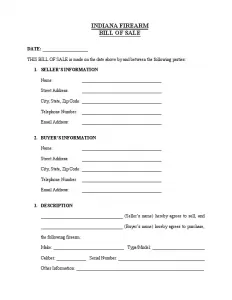
How to write an Indiana Firearm Bill of Sale?
The completing advice was written for the Indiana firearm bill of sale form created by our team. We strongly suggest using the local official form when possible.
Step 1: Specify the document’s creation date.

Step 2: Enter the details of both parties (seller and buyer):
- Full legal name
- Street address
- City
- State
- Zipcode
- Mobile phone number
- Email

Step 3: Describe the gun being sold:
- Manufacturer
- Type or model
- Caliber
- Serial number
- Other information
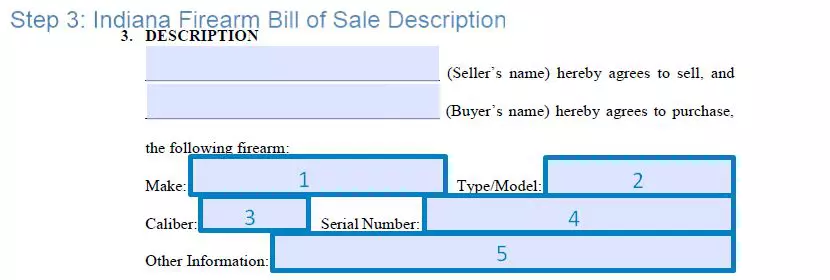
Step 4: Enter the payment method and amount.
This step also requires indicating the exact date of the purchase and the complete sum approved by all parties of the deal. After that, pick one selling method:
- The overall amount straight away. This one is rather simple: the purchaser pays the total sum in a single payment and gets the gun transported to them on the same day.
- Trade-in. This choice allows the purchaser to trade their firearm (with a supplement) for the seller’s firearm. You also need to add the information about the purchaser’s gun.
- Installments. Using this method, you need to enter the dates when the buyer must deliver the first and the last payments, along with their sums.
- Giving the firearm as a gift.
And after that, specify how the buyer is going to pay:
- Cash
- Cheque
- Cashier’s cheque
- Money order
Finally, check if the purchase cost includes all applicable taxes.
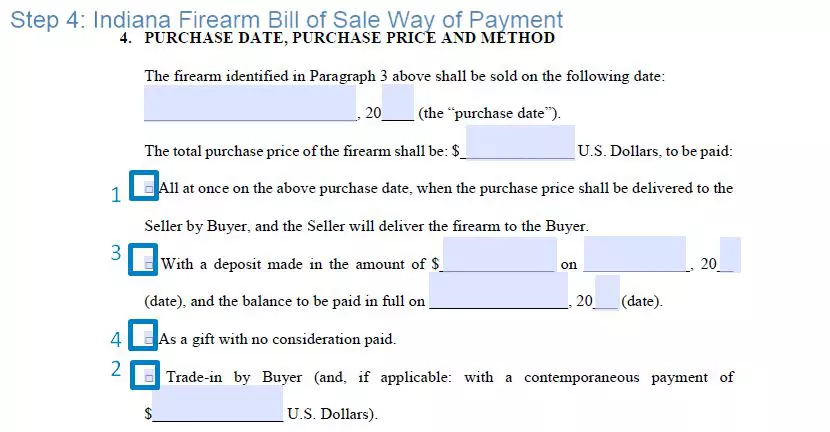
Step 5: Go over standard terms and make sure that both sides are familiar with them.
They typically say that the buyer obtains the gun sold in “as-is” condition and is liable for it after the transaction is completed.

Step 6: Now, the form must be signed.
The buyer is typically not required to sign the form. However, you’ll be more protected against legal troubles if all sides sign the bill of sale form. As an extra safety measure, you could have one or two individuals witness the process and sign the bill of sale.
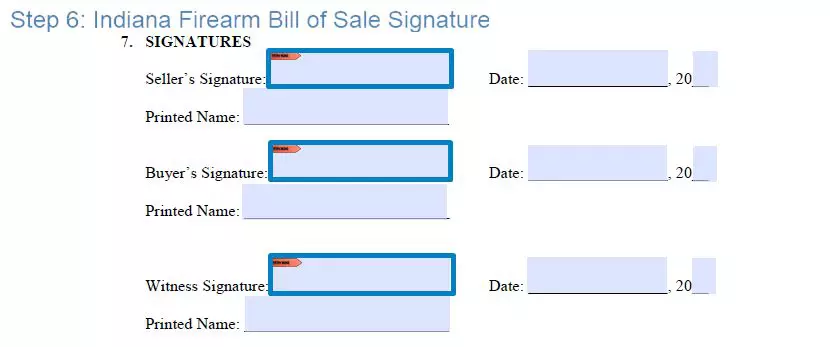
Step 7: Notarize the document
Notarization is generally not mandatory, but it can be a good approach to introduce another level of legal protection to the agreement. Another thing that would be prudent to do is to keep the bill of sale in the personal records of both parties. It will let both buyer and seller avoid legal issues in the future.
